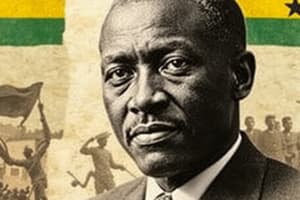Podcast
Questions and Answers
What was the significance of the Atlantic Charter issued during World War II?
What was the significance of the Atlantic Charter issued during World War II?
- It called for self-determination of all peoples. (correct)
- It established the United Nations (UN).
- It initiated the African Independence Movements.
- It declared Africa as a colonized continent.
Which document enshrined the principle of equal rights irrespective of race, religion, sex, or nationality?
Which document enshrined the principle of equal rights irrespective of race, religion, sex, or nationality?
- The African Independence Manifesto
- The African Charter on Human and Peoples' Rights
- The Declaration of Human Rights (correct)
- The Universal Decolonization Accord
Who were some prominent leaders advocating for African self-determination during the decolonization period?
Who were some prominent leaders advocating for African self-determination during the decolonization period?
- Winston Churchill, Franklin D. Roosevelt, Charles de Gaulle
- Donald Trump, Vladimir Putin, Angela Merkel
- Barack Obama, Margaret Thatcher, Mahatma Gandhi
- Nelson Mandela, Kwame Nkrumah, Julius Nyerere (correct)
How did most African countries achieve independence during the decolonization period?
How did most African countries achieve independence during the decolonization period?
What was one of the key reasons that led to the growing demand for independence in Africa?
What was one of the key reasons that led to the growing demand for independence in Africa?
What was one major challenge faced by many African countries in their quest for economic development after gaining independence?
What was one major challenge faced by many African countries in their quest for economic development after gaining independence?
During post-colonial politics in Africa, what types of governments emerged?
During post-colonial politics in Africa, what types of governments emerged?
What was a significant influence on the political landscape of post-independent Africa?
What was a significant influence on the political landscape of post-independent Africa?
How did the conditions attached to international aid from organizations like the IMF affect economic growth in independent African countries?
How did the conditions attached to international aid from organizations like the IMF affect economic growth in independent African countries?
Which factor contributed to the destabilization of economies in African regions during post-colonial times?
Which factor contributed to the destabilization of economies in African regions during post-colonial times?
Flashcards are hidden until you start studying
Study Notes
Independent Africa
Independent Africa refers to the period after World War II when African countries gained their independence from European colonial powers. This era marked significant changes in political landscape, economy, and society of the African continent.
Decolonization
Decolonization was the process through which former colonies became independent nations. It began with the Atlantic Charter issued by Winston Churchill and Franklin D. Roosevelt during World War II, calling for self-determination of all peoples and the end of territories that were under military occupation. In 1945, the United Nations (UN) adopted the Declaration of Human Rights, which enshrined the principle of equal rights irrespective of race, religion, sex, or nationality. However, it took decades before this principle could be implemented across Africa, where most countries achieved independence only between the late 1950s and early 1970s.
The demand for independence grew stronger due to increasing awareness and mobilization among Africans themselves. Many leaders emerged who advocated for African self-determination, such as Nelson Mandela, Kwame Nkrumah, Julius Nyerere, Patrice Lumumba, Jomo Kenyatta, and Robert Mugabe. Some countries gained independence peacefully, while others experienced armed struggles, such as the Algerian War of Independence from France.
Economic Development
After gaining independence, many African countries faced numerous challenges in their quest for economic development. One major challenge was the legacy of colonial rule, which had focused on exporting raw materials instead of developing local industries. Another challenge was the shift in global trade patterns after World War II, with increased competition from industrialized nations.
African states sought aid from international organizations such as the UN and the International Monetary Fund (IMF) during this period. However, the conditions attached to this aid often hindered growth, as they required neoliberal policies that favored foreign companies over domestic firms. Additionally, conflicts such as the Liberian Civil War and the First Congo War further destabilized the economies of affected regions.
Post-Colonial Politics
Post-colonial politics refers to the political situation in Africa after decolonization. The period saw various forms of governments emerge, ranging from democratic to authoritarian regimes. Some independent African states, such as Ghana and Nigeria, adopted liberal democratic systems, while others constructed single-party systems with varying degrees of authoritarianism. The heterogeneity of post-colonial politics in Africa has led to diverse perspectives on the meaning of freedom and democracy.
Moreover, the Cold War significantly influenced the political landscape of post-independent Africa. The Soviet Union formed alliances with some African states, such as Ethiopia and Angola, while capitalist powers supported others, such as South Africa and Somalia. This period was marked by intense ideological polarization and military interventions, notably from the United States and the Soviet Union, into African affairs.
In conclusion, Independent Africa represents a profound transformation in the history of the African continent. The decades following independence brought about changes in governance, economic development, and social dynamics. While there have been success stories of progress and development, the path towards true self-determination remains challenging, requiring sustained efforts from within the continent and from the international community.
Studying That Suits You
Use AI to generate personalized quizzes and flashcards to suit your learning preferences.




